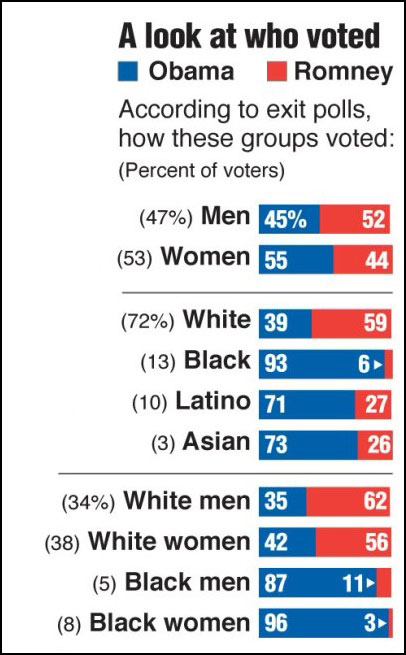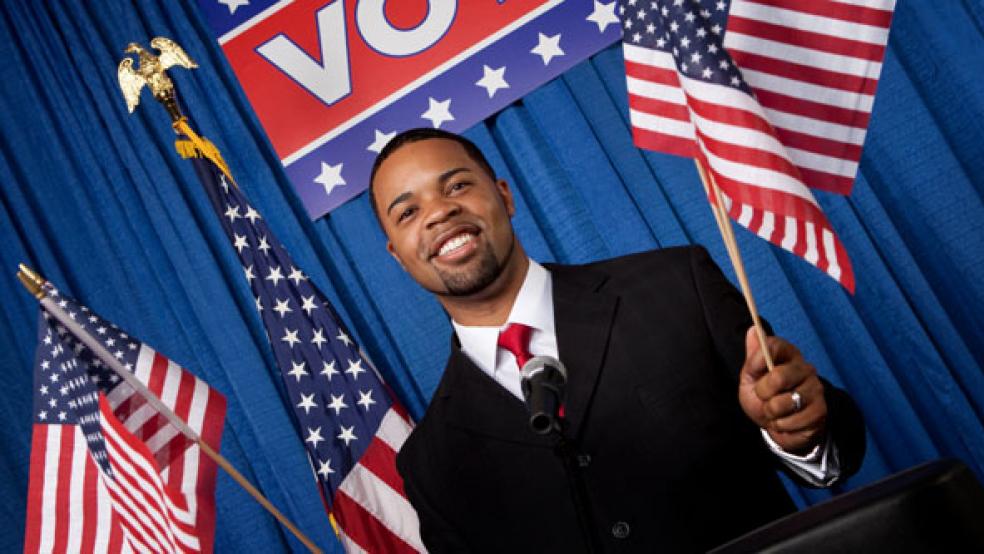On Monday, the Republican National Committee released a report analyzing the party’s loss in last year’s presidential election. It was surprisingly frank about Republicans’ failure to attract just about any group except white men; women, young people and every racial and ethnic minority in the country feel alienated by the GOP’s policies and style, the report said.
RELATED: Republican Soul Searching Could Reboot the GOP
Unless the Republican Party can move beyond its base, it faces political euthanasia down the road. As the report explains, the electorate was 88 percent white in 1980; in 2012 the white share fell to 72 percent. Hispanics have risen from 7 percent of the electorate in 2000 to 10 percent last year. By 2050, whites will only represent 47 percent of the population; Hispanics will comprise 29 percent and Asians 9 percent.
This information is not news to demographers and political analysts familiar with Census Bureau population projections. Back in 2007, I was reading analyses by the sociologist Ruy Teixeira and others forecasting doom for the GOP as the white population inevitably declined. With Republicans hostile to immigration reform, I saw no way they could reach out to Hispanics. Therefore, Republicans needed to attract some other minority group if they were to avoid being permanently locked out of the White House.
I saw developing tensions between Hispanics and blacks. They are natural political and economic competitors, it seemed to me, and it would not take much to drive a wedge between them. For example, polls show that blacks are very sympathetic to a hard line on immigration, since they view Hispanics as contenders for jobs, housing and the Democratic Party’s political favors.
Moreover, many African Americans were chaffing at being taken for granted by the Democrats and would prefer that both parties compete for their votes. And I thought enough time had passed since the civil rights era that blacks no longer automatically owed the Democrats their loyalty.
Therefore, I concluded that the time was ripe for Republicans to make a major effort to attract black voters. If Republicans could just get their share of the African American vote back to where it was under Dwight Eisenhower – about a third – this would have enormous electoral consequences in many states.

Very few Republicans know anything about the history of the race issue in America. Blacks, on the other hand, are keenly aware of it and it is essential for Republicans to be aware of it to be able to talk to African Americans without condescension about their circumstances, and how Republican policies will benefit them.
If Republicans were going to go into the black community to solicit votes, they would need a story to tell. Thus I thought a history of the Democratic Party’s long and ugly history of racism would help Republicans break the ice with black voters. The history is indisputable and when I first conceived a book on the subject, I was astonished that no one else had ever gathered all this material in one place.
There are a number of books that celebrate the black Republicans who were elected to Congress during Reconstruction. But for most blacks that is ancient history. And when Republicans talk about black Republicans such as Colin Powell or Condoleezza Rice, it smacks of tokenism to most of them. Therefore, my idea of attacking the Democrats’ racial history had more promise.
I also wanted to deal with the inevitable response that the Democrats’ racist history is old news, whereas Republicans have followed the so-called Southern Strategy since the 1960s. I believe Republicans have been remiss in not defending Presidents Nixon and Reagan from unjustified charges of racism.
Finally, Republicans need more than the same-old-same-old policies if they were to get black voters to give them an audience. I don’t care how certain Republicans are that the minimum wage destroys jobs for black workers--this sort of thing is never going to sell in the black community. Just quoting the black economists Thomas Sowell and Walter Williams doesn’t cut it, politically.
I decided that reparations to blacks for the history of slavery and racism that they suffered was an idea worth proposing. Of course, the vast majority of Republicans react very negatively to the suggestion, but I thought it was possible to make it palatable. If reparations are rejected, they have to find something else to offer African Americans or their outreach efforts will be futile. Like it or not, the GOP has a bad reputation in the black community and something new and substantive must be part of the package. If it is just going to preach the free market gospel, it is a waste of time and money.
If reparations were combined with complete elimination of affirmative action, an idea first proposed by the conservative columnist Charles Krauthammer, Republicans might buy it. I left open the means by which reparations might be paid and definitely think just mailing a check out to every black family is not viable. I think there are creative ways to do this that require further thought and analysis.
I wrote all this up in a book, Wrong on Race: The Democratic Party’s Buried Past, which was published by Palgrave Macmillan in early 2008 – the same day Barack Obama won his first primary and totally ruined my strategy. Nevertheless, I met with John McCain’s minority outreach people just in case Hillary Clinton managed to pull out the nomination and make my plan viable.
With Obama term-limited and no African Americans poised to replace him in 2016, and with Republicans eager to reach out to minorities, perhaps my idea may have a second life. I sent a copy of my book to RNC Chairman Reince Priebus on Monday. I hope he reads it.




